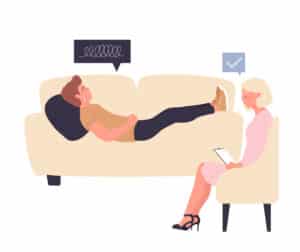Being a child and growing into a teenager can be a tumultuous time. Parents, think back to when you were a child. Remember all the angst and anxiety you felt about the physical changes happening in your body, fitting in with peers at school, and learning how to live in harmony with your parents?
Throughout high school and middle school, teens must face social anxiety, self-esteem issues, self image issues, stress, time management, and coursework. On top of that, today’s teens face additional struggles and stressors that come along with living in the era of social media, global pandemics, and climate collapse.
There is no wonder why the United States is facing a youth mental health crisis. Today’s teens are battling depression, anxiety, trauma, and more. When faced with all of this adversity, it is only natural that our children may occasionally get stressed out, overwhelmed, or moody. As a parent, it can be difficult to determine whether your child is reacting normally to the normal ups and downs of life, or if they are living with a developing mental illness such as depression, anxiety, or bipolar disorder.

Mental Health Issues in Teens
According to the National Institute of Mental Health (NIMH) “over 4 million adolescents ages 12-17, suffered from at least one major depressive episode in 2020.” This is a staggering statistic, and it is only natural to wonder about your own child.
A child experiencing a mental illness may have mood swings that are more severe than those of other teenagers. However, because experiencing mood swings is a normal part of being a teenager, it is important to look for other symptoms of depression that your child may be exhibiting.
Symptoms of Depression in Teens
- Spending abnormal amounts of time alone
- Becoming disengaged or averse to activities previously enjoyed
- Decreased ability or inability to concentrate
- Abnormal changes in eating and appetite
- Increased thoughts about suicide or death
Mood Swings vs. Mental Illness
Fluctuating moods are a normal part of human development and change, but if your teenager is having significant changes in their moods or emotions throughout the day, this could be a warning sign of a developing mental illness.
Teenagers exhibiting uncharacteristically negative behavior symptoms that last more than two weeks, or if their moods and emotions are so volatile that they are unable to function, they may have an issue that needs to be addressed by a healthcare provider.
Depression, anxiety, or another mental illness or mood disorder can have a devastating effect on your child during such a formative era of their life. Below are some of the most common mental illnesses that teens may experience. These mental illnesses affect how your child thinks, feels, and behaves, and are also likely to get confused with mood swings.
- Depression – Your teen may feel overwhelming sadness or emptiness for extended periods of time with low moods most days of the week. They also may exhibit irritability or seem disengaged from daily life.
- Anxiety Disorders – Your teen may be preoccupied with worry and fear, feeling shaky or tense throughout the day, being unable to sleep well at night, and having difficulty concentrating.
- Bipolar Disorder – Your child may experience extreme fluctuations in their mood, ranging from euphoric highs to devastating lows. Children and adolescents with bipolar disorder often experience episodes of mania, a period of an abnormally elevated mood, followed by depression, a period of an abnormally low mood.
One of the most important factors in determining whether your teen is developing a mental illness is the duration of the behaviors in question.
We all have occasional periods where we feel anxious, down, depressed, sad, or overwhelmed based on the circumstances of our lives. Teenagers have the same feelings based on what is going on around them. Fleeting mood swings that come and go are normal. Down, depressed, sad, or aggressive moods that linger for days, weeks, or months on end are signs of deeper issues brewing under the surface.
However, if your teen’s mood swings last for days or weeks that never seem to end, it’s time to seek the help of a professional.
When to Seek Help
Having intense emotions during early adolescence or puberty is normal during the teenage years. Many parents struggle to recognize the difference between normal mood swings and symptoms of depression. Sometimes they can appear very similar, and it may take multiple conversations with your child if they continue to exhibit extreme changes in demeanor. If your child seems to struggle in multiple areas of their life and nothing seems to improve mood swings, it may be time to take a closer look.
Extreme emotional responses may show the beginning signs of teen depression or anger issues. Showing signs of depression, or displaying any of the following symptoms along with less than healthy habits or bad behavior can show your teen’s issues relate to something more than hormonal surges, and that they may need professional help.

Teenage Mood Swings or Teen Depression?
Chemical changes in the brain responsible for adolescence and puberty can affect mood, and hormones that can cause sudden emotional changes or extreme mood swings.
Knowing the difference between normal teenage mood swings and clinical depression is the best way to find the right solution to help them.
Signs to Look For
If your teen is suddenly in a bad mood related to a particular situation that happened in their life, this is likely not clinical depression.
However, if your teen is suddenly engaging in high-risk activities such as, taking drugs or drinking alcohol, spending more time with a new group of friends, not spending time with friends at all, or becoming more detached from daily life, these can be a sign of something more.
More Indicators of Depression or Other Mental Illness
- Declining social life
- Hearing or seeing things that aren’t really there
- Suicidal thoughts or attempts
- Self-harm
- Crying more often than usual
- Behavior problems at school
- Irritability
What Can I Do?
If you are worried about your teen’s moods — talk to them about it. Encourage healthy sleep habits and daily exercise in adolescents to reduce the negative effects on teens’ moods or depression. Invite them to participate in family activities, while being empathetic if they are not feeling up to it. Try not to take their anger or sadness personally; remember that adolescence can be difficult for everyone.
There are many resources available that can help both of you understand what is going on and find a treatment plan if needed.

Adolescent Mental Health Professionals
An adolescent psychiatry professional is a teen mental health professional that can help parents differentiate typical teenage mood swings from more serious issues that can affect healthy child development.
Get help from mental health professionals if your teen appears to be on an emotional roller coaster or engaging in high-risk behavior like alcohol or drug abuse.
- Psychiatrists – Psychiatrists are licensed physicians who specialize in the diagnosis, treatment, and prevention of behavior disorders.
- Psychologists – Psychologists use their expertise to help people learn, grow, and cope with challenges in their lives. They often work with individuals or groups to understand the root causes of problems and suggest solutions.
- Clinical Social Workers – CSW’s work with people in need. They help clients to understand and manage their emotions, relationships, and stress. Clinical social workers also provide support during difficult times or when a person needs help to deal with a specific problem.
- Therapists – Therapists help their patients resolve emotional and behavioral issues. They may specialize in a certain type of therapy, such as cognitive-behavioral therapy (CBT), family counseling, or social work. Therapists also often work with clients to develop coping mechanisms for addressing stress and traumatic experiences.
- Counselors – Counselors work with individuals or families to help them resolve personal problems and reach their goals. They typically have a Master’s degree in psychology, social work, counseling psychology, or another related field.
- Family Nurse Practitioners – Family Nurse Practitioners are nurses who specialize in providing care for families. They work with parents and children to help them stay healthy and safe. Family Nurse Practitioners can provide care for a variety of illnesses, including asthma, diabetes, and newborn health.
Get Teen Mental Health Support
Finding support for your struggling teen doesn’t have to be complicated when you know where to look. Parents can find support by contacting licensed professionals who specialize in providing teen and adolescent mental health support services.
The teen mental health experts over at Clear Recovery Center – Teen Program can help you and your teen get back to feeling like their normal selves. Our clinical team can help uncover the underlying causes of mental health and address them in order for your teen needs to alleviate intense mood swings as well as teach them healthy coping strategies for dealing with stress, setbacks, and adversity. Clear Recovery Center can help teens and families build healthy relationships while learning real-life strategies for managing real-life issues effectively. Call us today 866.522.2084 to find out how we can help you and your family.

